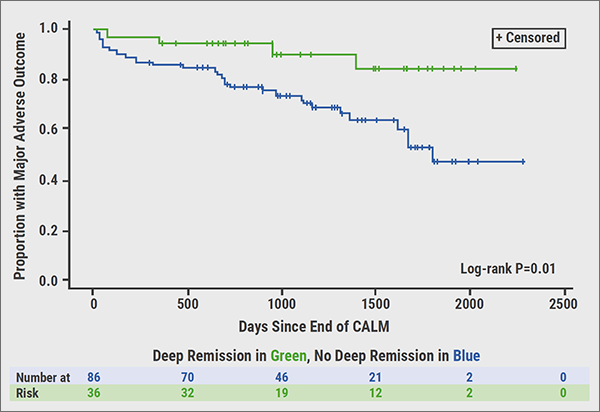A retrospective analysis of medical records of patients with follow-up data since the end of CALM showed that patients with early Crohn’s disease (CD) who achieve endoscopic or deep remission after 1 year of intensive treatment are less likely to have disease progression over a median of 3 years [1]. The results were presented by Dr Thierry Yzet (Amiens University Hospital, France). Participants (n=122) from 31 centres were stratified by outcomes in CALM at 1 year:
- clinical remission (Crohn’s disease activity index, CDAI <150);
- endoscopic remission (Crohn’s disease endoscopic index of severity, CDEIS <4 with no deep ulcerations); and
- deep remission (CDAI <150, CDEIS <4 with no deep ulcerations, and no steroids for ≥8 weeks).
The primary outcome was a composite of major adverse outcomes reflecting CD progression: new internal fistula/abscess, stricture, perianal fistula/abscess, CD hospitalisation, or CD surgery since the end of CALM. Median follow-up time from the end of CALM was 3.02 years. Fifty per cent of participants were randomised to the tight control arm. During follow-up, 34 patients (27.9%) had a major adverse outcome. Patients in clinical remission at 1 year did not have significantly lower rates of the composite endpoint (log-rank P=0.15). Patients in endoscopic and deep remission at the end of CALM were significantly less likely to have a major adverse event over time.
After adjusting for age, disease duration, prior surgery, prior stricture, and randomisation arm, endoscopic remission (aHR 0.44, P=0.038) and deep remission (aHR 0.25, P=0.01) were significantly associated with lower risk of major adverse events. Dr Yzet concluded: “Early CD patients who achieve endoscopic and deep remission at 1 year, had a 56% and a 75% decreased risk, respectively, of disease complications over a median of 3 years” (Figure 1 and 2). “Reaching the targets of endoscopic and deep remission early in the course of CD can result in long-term disease modification.”
Figure 1: Kaplan-Meier estimates of CD disease progression based on endoscopic remission at 1 year [1]

Figure 2: Kaplan-Meier estimates of CD disease progression based on deep remission at 1 year

1. Yzet T, et al. ECCO 2019, OP35.
Posted on
Previous Article
« Microbial composition and psychological wellbeing Next Article
Ustekinumab as maintenance therapy and with shortened interval »
« Microbial composition and psychological wellbeing Next Article
Ustekinumab as maintenance therapy and with shortened interval »
Table of Contents: ECCO 2019
Featured articles
Interview with Prof. Janneke van der Woude
New Compounds: Study Results
Short-term and Long-term Treatment Results
The right drug for the right patient
Vedolizumab superior to adalimumab in ulcerative colitis
Complementary and Alternative Medicine
Crohn’s disease exclusion diet + partial enteral nutrition in paediatric Crohn’s disease
Microbial composition and psychological wellbeing
Remission
Early remission of Crohn’s disease prevents progression
Proactive adalimumab trough measurements
Observational Studies
IBD risk of treatment with IL-17 antagonists
Basic and Preclinical Research
Immune cells and microbes: a happy marriage?
Genetics
Related Articles
May 9, 2019
Efficacy and safety of biosimilars

May 9, 2019
Letter from the Editor
© 2024 Medicom Medical Publishers. All rights reserved. Terms and Conditions | Privacy Policy

